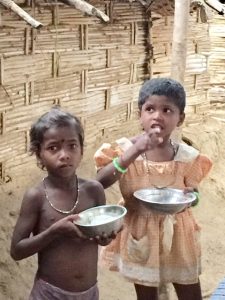by: Dr. Malcolm Blowes / Win Our Nations
 So many of us Americans have never come to the reality of just what a blessing it is to be born or live in the good ol’ USA, the greatest country in the world. We are all tempted to gripe and complain about anything and everything from politics and politicians to the cost of groceries and the price of gas. We certainly may not agree with the views of some of our leaders, but most of us would agree that they have a right to their opinions, just like everyone else. In many countries of the world the citizens don’t have that right, no freedom of speech or liberty of worship, but are oppressed, hungry and without hope. In many countries, Christians are persecuted and slain, minorities are marginalized and women are not allowed to express their opinion or even drive a vehicle, and some must even keep their faces covered.
So many of us Americans have never come to the reality of just what a blessing it is to be born or live in the good ol’ USA, the greatest country in the world. We are all tempted to gripe and complain about anything and everything from politics and politicians to the cost of groceries and the price of gas. We certainly may not agree with the views of some of our leaders, but most of us would agree that they have a right to their opinions, just like everyone else. In many countries of the world the citizens don’t have that right, no freedom of speech or liberty of worship, but are oppressed, hungry and without hope. In many countries, Christians are persecuted and slain, minorities are marginalized and women are not allowed to express their opinion or even drive a vehicle, and some must even keep their faces covered.
As full-time overseas missionaries for 25 years who have travelled into over 30 countries, we have witnessed literally millions of people that have no access to daily food, who would never complain about the line at Walmarts not moving as fast as the lane others are in. In fact, when we have brought people over for short visits to the west they take photos of our produce stands at the supermarkets, as they know on their return their friends back home would not believe them. On a train returning to Madras last November, I read in a local newspaper about the desperate plight of a people group in India. I felt immediately a strong urge to get involved. At the time of writing this both my wife Phyllis and I are back in India ministering to the plight of the Adivasi tribal people near Mumbai (Bombay). Here is part of that report:
 About 107 kilometers from Mumbai lies the Palghar district, where over 600 children so far, this year (2016) have died due to malnutrition. Even though the media has created much hue and cry over these deaths, the state government has continued to a turn blind eye to the grievous issue. It was the National Human Rights Commission (NHRC) that took a note of the media reports and observed that such a huge number of deaths of children in a year amounted to a violation of the right to life and health of the victims.
About 107 kilometers from Mumbai lies the Palghar district, where over 600 children so far, this year (2016) have died due to malnutrition. Even though the media has created much hue and cry over these deaths, the state government has continued to a turn blind eye to the grievous issue. It was the National Human Rights Commission (NHRC) that took a note of the media reports and observed that such a huge number of deaths of children in a year amounted to a violation of the right to life and health of the victims.
Instances of malnutrition and the resultant deaths from it are not new in Palghar, which is predominantly a tribal district. Every year 300 – 400 kids die due to malnutrition. The number of death of kids is 512, 485 and 600 for the year 2013-14, 2014-15, and 2015-16 respectively. The number of malnourished kids is not less. Palghar has a severe number of malnourished kids 1,465, which means that they need immediate treatment. Moderately malnourished kids number 5,864. Thus, the district has overall 7,230 malnourished kids and areas Makhoda, Vada, Vikramgad and Jawhar are the worst affected.”
The death of two-year-old Sagar Wagh who weighed less than 11 lbs. on August 30 brought the issue of malnutrition in focus. When the tribal minister Savara finally went to visit the family of the victim after two weeks, they refused to meet him. Around 3,663 kids are battling with malnutrition in the constituency of Savara.” There is not a single pediatrician and gynecologists in the primary health centers across the district. In Palghar, malnutrition most affects the Kathkari tribe, a onetime forest community which is among the lowest in the pecking order of the Indian caste system.
Most children who died this year due to malnutrition linked illnesses were from the Kathkari community. The root cause of the matter is, “People do not have purchasing capacity, they have no money to buy food or admit their children in schools. These are not malnourishment deaths. These are starvation deaths. Kids are not malnourished; their entire families are malnourished.”
“Malnourishment is a symptom of a disease. The real problem is a lack of employment opportunities. Only land and forest can avail livelihood opportunities here in Konkan area as no industry or service industries are developed. According to government data about 39% of Indian children suffer from chronic undernutrition and around 42.5% are underweight.
Villagers start leaving Palghar in December for the Mumbai satellite towns of Thane and Bhiwandi where they often work 12 hour shifts at construction sites or road building projects. Employers usually prefer to hire Kathkari couples as they coordinate better and are cheaper than two men, with men paid around Rupees 200 $($3.00) daily and women anywhere between Rupees 50 (0.75c) – 100 ($1.51). The migrant workers survive on rice and the occasional dish of potato and onions, saving their money for the jobless months.
Once the monsoon season halts construction, workers return to villages in July for a jobless spell until October, when the start of the harvest provides daily work on farmland. Locals refer to September as “starvation month”, when many people are unemployed and children’s deaths peak. The end of the harvest in December again signals the end of the villagers’ home stay.
In the last three years, malnutrition has claimed the lives of about 1,600 children in Palghar, a tribal region battling high unemployment and poverty, with national headlines over child deaths prompting government action to address the problem.
“Palghar’s problem of malnutrition is shocking because of its proximity to Mumbai, but it is migration to Mumbai that is at the root of this problem,” “People from Palghar migrate to Mumbai for work, but the cost of living there is very high. They don’t eat to save money.” Doctors said children suffer due to irregular feeding patterns when both parents work long hours. “The parents’ priority is not their child’s health but to earn their daily wages,” said Ramdas Marad, superintendent at the Palghar sub-district hospital that runs at twice its capacity in the monsoon months between June and September. “Children are more vulnerable to disease such as pneumonia or respiratory infections during this time as they are weak and their immunities are compromised.”
There is also not one Christian witness or church, visiting pastor or evangelist in the whole region. While giving out food to them it was the first time they had ever heard there was Good News. We will be returning to our base in Cocoa about the same time as this edition of “Spotlight Magazine” comes out. We plan on returning as soon as finances allow us and setting up a worker to permanently minister there. Anyone reading this is welcome to come join us or help in any way they can. www.winournations.com,
“Blessed is he who considers the poor; The Lord will deliver him in time of trouble. The Lord will preserve him and keep him alive, and he will be blessed on the earth. You will not deliver him to the will of his enemies. The Lord will strengthen him on his bed of illness. You will sustain him on his sickbed”







